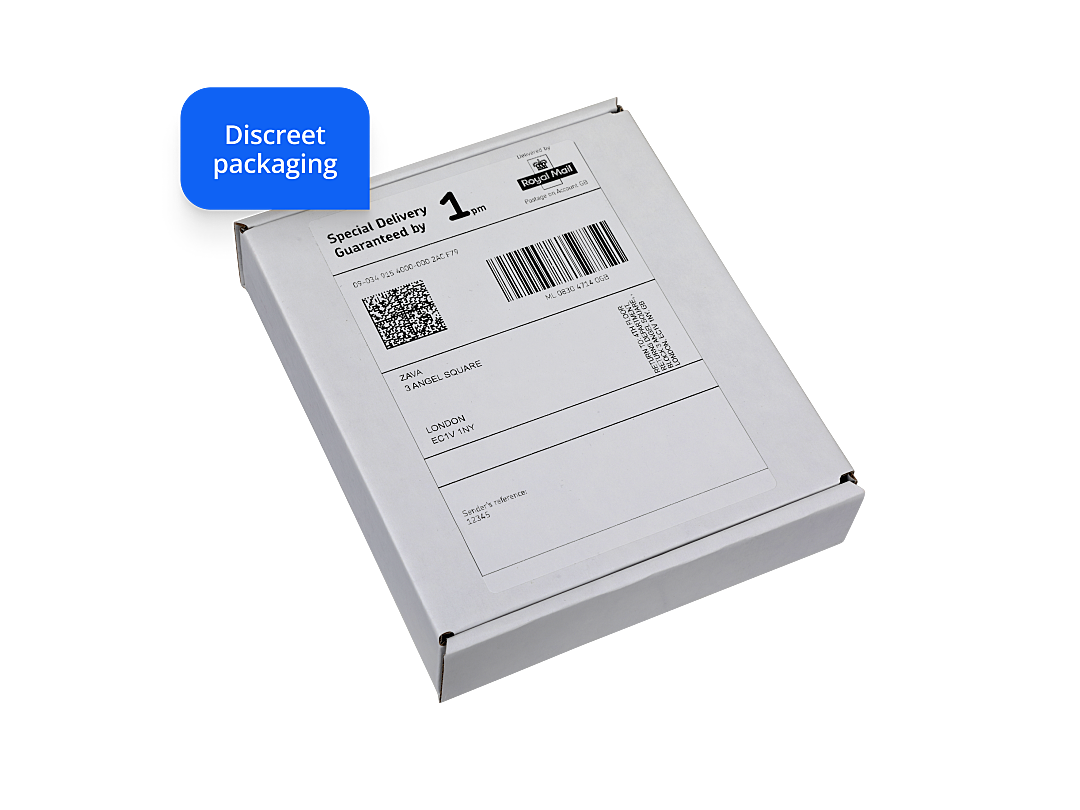Sumatriptan Tablets
Request Sumatriptan tablets online for migraine with free, fast and discreet delivery




Prices from £23.00
In stock. Simply fill in a brief consultation questionnaire and one of our doctors will review your request today.
-
Sumatriptan is a prescription migraine treatment that helps control the blood flow to parts of your brain causes migraine pain and discomfort.



About Sumatriptan
What forms sumatriptan comes in
It's available in the following forms:
- Tablet
- Nasal spray
- Injection
Tablets are the most common form of treatment. The nasal spray is used if you have difficulty swallowing tablets because of vomiting. Injections are less commonly used and are reserved for severe cases of migraine.
Side effects of sumatriptan
Common side effects include:
- dizziness
- feeling sick (nausea)
- vomiting
- drowsiness or tiredness
- tingling, numbness or a burning sensation on your skin
- flushing
- short term increase in blood pressure
- muscle pain
- heaviness in any part of the body including chest and throat
- sensations of hot or cold
- unpleasant taste (with the nasal spray)
Rare side effects may include:
- low blood pressure
- palpitations
- changes in liver function tests
-
-
What kind of medication is it? – Sumatriptan belongs to a class of medicines called triptans, also known as selective serotonin receptor agonists (or 5HT1- receptor agonists). It’s mainly prescribed to relieve symptoms of a migraine. Sumatriptan was the first triptan to be developed and is also known by the brand name Imigran.
What is sumatriptan used for?
Sumatriptan is used to treat a migraine attack that occurs with or without disturbances to your senses. The sensory disturbance that occurs with a migraine is called an aura. Sumatriptan can also be used to treat symptoms of a cluster headache.
How does sumatriptan work?
It blocks the release of substances within the brain that widen blood vessels (this is thought to contribute to migraines), it causes blood vessels to constrict and blocks pain pathways in the brain.
Does sumatriptan prevent migraines?
it’s not prescribed to prevent migraines and isn’t used with other groups of medicines which treat migraines. There is also currently no cure for migraines, but sumatriptan is an effective and common treatment.
It is important to discuss with a doctor the risks and benefits of using this medicine and to make sure the doctor knows about all other medicines being used.
-
-
You can reorder sumatriptan through our online service at ZAVA. Our certified online doctors provide fast and convenient repeat prescriptions. Our service is for those who have already been diagnosed with migraines by a doctor. We offer:
- sumatriptan 50 mg and 100 mg Tablets
- Imigran nasal spray (sumatriptan)
How to request
To request your tablets or nasal spray, you need to complete a short online questionnaire. Once your medication has been approved by one of our doctors, we’ll dispense and post your medication. Delivery is free.
Why request online?
Our service offers the advantages of being quick and easy to use. It can also work out cheaper and we have different delivery options to suit you. Our service also includes a healthcare professional regulating the supply of your medicine to ensure it’s safe for you.
How else can I buy it?
Sumatriptan 50 mg tablets are also available to purchase from some pharmacies if you have had your first migraine previously diagnosed by a doctor. The maximum daily dosage is 100 mg. The brand name is Imigran Recovery.
-
-
Who is it for? – Sumatriptan is prescribed for adults aged 18-65 who are experiencing migraine symptoms. There is limited information on the use of sumatriptan in people aged under 18 or over 65 years.
When is it not suitable to take sumatriptan? – Sumatriptan is not recommended if you have any of the following:
- An allergy to sumatriptan or any of its excipients
- A recent heart attack or coronary heart disease
- Prinzmetal’s angina – a type of chest pain that occurs during rest
- A recent stroke or a history of a stroke
- Severe liver impairment
- Moderate or severe high blood pressure or mild high blood pressure which is not controlled
Please see the patient information leaflet provided with sumatriptan for a full list of contraindications.
Does sumatriptan interact with other medicines? – yes, it can. The following medicines interact with sumatriptan and should not be taken together:
- Another triptan
- Ergotamine or ergotamine derivative medicine such as methysergide
- Monoamine oxidase inhibitors (MAOIs) or within two weeks of stopping treatment with a MAOI
How can I tell if I should take sumatriptan? – getting a doctor’s assessment will help you figure out if you’re experiencing migraines. The main symptom of a migraine is a painful throbbing sensation on one side of your head, which usually worsens when you move it. Sometimes the pain can spread to your face or neck. There is no actual test to diagnose a migraine but your doctor will be able to assess your medical history and rule out any other causes for your symptoms so you can get effective treatment.
-
-
The risk of side effects – as with any medicine, sumatriptan may cause side effects, but not everybody experiences them. For common and rare side effects, see the 'side effects of Sumatriptan' section to the right.
How can I manage side effects? – most side effects are not troublesome and some overlap with the symptoms of a migraine. Still, there are some things you can consider:
- If your side effects become troublesome and persistent then speak to your doctor
- Some common side effects such as muscle pain can be managed by taking a simple painkiller alongside Sumatriptan as advised by your doctor or pharmacist
- Eating simple non-rich foods and lighter meals can also help with any sickness
- Make sure you get appropriate rest if you experience tiredness. Do not drive or operate heavy machinery if you're affected
Overusing sumatriptan – using sumatriptan for 10 days or more per month is defined as overuse and can cause some long term problems. Overuse of sumatriptan can stop other medicines used to prevent migraines from working effectively. Overuse of sumatriptan may cause ‘overuse headaches’. These are dull constant headaches which are often worse in the morning. ‘Overuse headaches’ are also related to a ‘rebound phenomenon’ which can cause further headaches once you stop treatment. Long term use may also lead to kidney or liver problems.
Serotonin syndrome – sumatriptan can increase your serotonin levels. Serotonin is a chemical produced by your nerve cells which is involved in your wellbeing. This can rarely cause a condition called ‘serotonin syndrome’. Make sure to tell your doctor if you’re taking another drug that might raise your serotonin levels, such as antidepressants. Seek immediate medical attention if you experience any of the following:
- Hallucinations
- Fast heartbeat
- Severe dizziness, nausea, vomiting or diarrhoea
- Muscle twitching
- Unexplained fever
What are the serious side effects of sumatriptan treatment? – if you get the following serious side effects, you should also stop taking sumatriptan straight away, and seek immediate medical attention:
- Fast or irregular heartbeat
- Fainting
- Severe stomach pain
- Bloody diarrhoea
- Seizures
- Signs of a heart attack (shortness of breath, sweating, and pain in the chest and/or along the left arm and jaw)
- Signs of a stroke (difficulty seeing, speaking, confusion, or weakness along one side of the body)
Very rarely, a severe allergic reaction to sumatriptan can occur. If you experience any signs such as a severe rash, difficulty breathing, swelling of the tongue, eyelids or face, seek immediate medical attention from your nearest A&E department.
-
-
How does sumatriptan compare to other over the counter (OTC) treatments? – currently sumatriptan is the only triptan that can be purchased OTC. Other OTC treatments which you can buy without a prescription include:
- painkillers like aspirin, paracetamol and ibuprofen – paracetamol and ibuprofen are also available as combined tablets with a low dosage of codeine
- caffeine – available as a combined tablet of paracetamol and caffeine
- anti-sickness medicine – available as a combined tablet with paracetamol
Painkillers do not specifically relieve migraine symptoms but treat the pain associated with it. They're used to treat various types of pain in different parts of the body such as toothache or backache. You can try Sumatriptan if painkillers do not sufficiently relieve your symptoms. Anti-sickness medicine only treats sickness associated with migraines. It does not help with other symptoms such as pain or aura. Sumatriptan is a more effective treatment for migraine as it can help with pain, aura and sickness. These symptoms are all thought to be associated with the widening of blood vessels in your brain which occurs as part of the migraine process.
How does sumatriptan compare to prescription migraine treatments? – other migraine treatments available on prescription include:
- Paramax® – this is a combination of paracetamol and a prescription only anti-sickness medicine called metoclopramide
- Migramax® – this is a combination of aspirin and metoclopramide
- Ergot alkaloids such as ergotamine – this is rarely used because of the risk of side effects and its difficulty in being absorbed adequately in your body
All triptans work in the same way and are usually equally effective for relieving migraine symptoms. There may be slight differences in how quickly they work, side effects and cost. If you do not tolerate sumatriptan, another triptan may be more suitable. Other triptans available on prescription include rizatriptan, naratriptan or zolmitriptan. Zolmitriptan can also be prescribed for cluster headaches.
Lifestyle changes – you can try a headache diary to help you find out what triggers your migraines. Triggers include certain foods, stress or hormonal changes. You should also try to keep a regular daily routine by eating and sleeping on time to help minimise the occurrence of migraines.
For some people, migraines happen more than once a week, or they’re severe enough to impact their life or work. This can be the case even when using treatments like Imigran. If this is how it is for you, your GP could be able to prescribe you preventative treatment, which you would take every day. This would try and stop the migraines from happening. If you think this could help you, we’d suggest talking to your GP to know more about the options.

Dr Kathryn Basford is a qualified GP who works as a GP in London, as well as with ZAVA. She graduated from the University of Manchester and completed her GP training through Whipps Cross Hospital in London.
Meet our doctorsLast reviewed: 17 Aug 2023
-
Common questions about sumatriptan, National Health Service [accessed February 2023]
-
Sumatriptan Film-coated tablets, Patient Information Leaflet, EMC [accessed February 2023]
-
Sumatriptan, NICE/British National Formulary [accessed February 2023]
-
Drugs for acute migraine, NICE/Clinical Knowledge Summaries [accessed February 2023]
-
Oral sumatriptan for acute migraine, Cochrane Database of Systematic Reviews [accessed February 2023]








